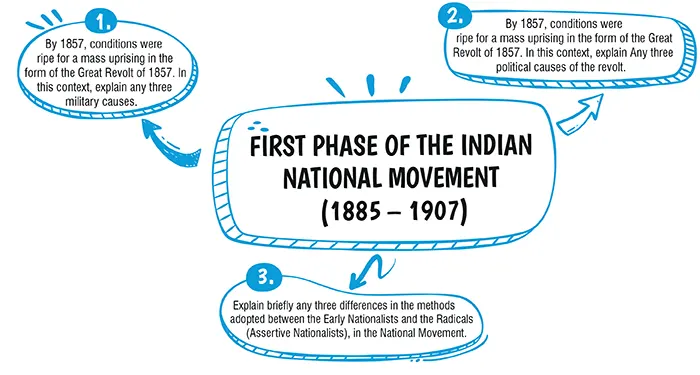Home / Board / ICSE / important Questions / Class 10 / History & Civics / World War I and treaty of versailles
Table of Contents

Ans. (b) Lorraine
Explanation:
Germany defeated France and annexed the French territory of Alsace-Lorraine. The war and the subsequent annexation caused widespread resentment and a strong desire for revenge in France. Bismarck tried to isolate France by keeping it aloof and by signing a series of defensive alliances.
Ans. (b) Black Hand
Explanation:
The dual murder of Archduke Franz Ferdinand and his wife in 1914 had been planned in Serbia by a secret society of patriotic terrorists, called the “Black Hand”.This incident led to the beginning of the First World War.
Explanation:
Four terms of the Treaty of Versailles which affected Germany after World War I :
1. The Treaty declared Germany guilty of aggression. Germany was required to pay for the loss and damages suffered by the Allies during the war. The amount of reparations was fixed at 33 billion dollars. Germany had to cede her merchant ships to the Allies as compensation and had to supply huge quantities of coal to France, Italy and Belgium for ten years.
2. The area of the Rhine Valley was to be demilitarised and the German territory west of Rhine was to be occupied by the Allied troops for 15 years.
3. Germany lost Alsace-Lorraine to France, Eupen-et-Malmédy to Belgium, and Schleswig to Denmark. Danzig became a free port in the Polish territory.
4. Germany ceded parts of her pre-war territory to Denmark, Belgium, Poland, Czechoslovakia and France. The coal mines in the German area called Saar were ceded to France for 15 years and the area was to be governed by the League of Nations
Explanation:
(i) The German Emperor William II fled away and a democratic government was set up there.
(ii) People’s Republic was set up in Russia after the Revolution of 1917.
(iii) The Republic was set up in Italy too.
Explanation:
The two triple alliances formed before the First World War were :
(i) Triple Alliance : It had Germany, Austria-Hungary and Italy as its members.
(ii) Triple Entente : It has Britain, Russia and France as its members.
The conflicts within Europe and the conflicts over colonies mentioned earlier had begun to create a very tense situation in Europe from the last decade of the nineteenth century. European countries began to form themselves into opposing groups. They also started spending vast sums of money to increase the size of their Armies and Navies, to develop new and more deadly weapons, and to generally prepare themselves for war, Europe was gradually becoming a vast armed camp.
France was defeated very badly in the Franco-Prussian War of 1870-71. After this war, the German Chancellor, Bismarck adopted such a diplomatic foreign policy as to keep France isolated and prevented her from establishing friendly relations with any other European country. Britain, as stated above, was alarmed at the growing military power of Germany. As early as in 1879, Germany had concluded a secret military alliance with Austria-Hungary called the “Dual Alliance”. It provided for mutual military assistance in case either country is attacked by France or Russia. Italy joined it later on in 1882. Thus, it was converted into “Triple Alliance”. Britain, Russia and France formed the Triple Entente in 1907. Thus, Europe was divided into two hostile groups. The real aims of the countries which joined these alliances were the extension of their colonial possessions, an all-European war almost certainly would become a worldwide war.
Download Mind Map of this chapter
Download NowWant to Practice Mock Tests of this chapter
Practice NowDownload Important Questions of this chapter
Download NowAns: World War I began on July 28, 1914, and ended on November 11, 1918, with an armistice agreement. The official end came with the signing of the Treaty of Versailles on June 28, 1919.
Ans: The major powers were divided into two main alliances: the Allies (mainly France, Russia, and the United Kingdom, later joined by Italy and the United States) and the Central Powers (mainly Germany, Austria-Hungary, and the Ottoman Empire).
Ans: The Treaty of Versailles was a peace treaty signed by the Allied Powers and Germany, officially ending the state of war. It imposed severe terms on Germany, including territorial losses, disarmament, and reparations.
CBSE Important Questions Class 10
ICSE Important Questions Class 10
CBSE Important Questions Class 10
ICSE Important Questions Class 10